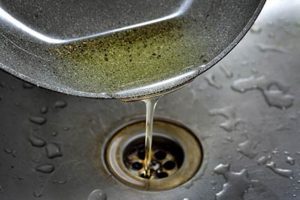WHY YOU SHOULDN’T POUR GREASE DOWN THE DRAIN

Did you know that pouring grease down the drain is bad for your drain?
People believe that there is nothing wrong with pouring grease down the drain so long as they do so with detergent and hot water. This belief is untrue. When you pour hot water and dish soap together with the grease, this will still harm your drain.
So, what are you supposed to do with the grease?
Together with St Louis Management, we will explain why you should not pour grease into your drain and the appropriate ways to dispose of these substances.
WHY IS GREASE BAD FOR YOUR DRAINS?
When grease is hot, it assumes a liquid form. In this state, it is easy to pour it into the drain. However, the grease will change from its liquid state to solid when it cools off in the pipe. In this solid state, the grease becomes a clog.
Over time and following repeated pouring of grease down the drain, these clogs accumulate to cause complete blockage and associated plumbing issues. The above scenario happens when the grease sticks to your pipes.
Something else occurs if this grease passes into the sewers without sticking to the pipes. In this case, the grease from various households and confectioneries in the neighborhood accumulates. Over time, this accumulated grease undergoes extensive chemical reactions and combines with calcium in the sewers.
This gives rise to soap-like compounds that we call fatbergs. Following an increase in the sewer levels, fatbergs can grow larger, cling to the sewer ceilings, and clog the sewer lines. Sometimes, removing large clumps of fatbergs and unblocking the sewers can last for weeks.
WHAT TO DO WITH LEFTOVER COOKING GREASE
Keep all grease away from your drains. These include lard, bacon grease, duck fat, cooking oils, etc. It doesn’t matter whether the oil is liquid or solid at room temperature. Below is what you should do:
FOR GREASE
If the volume of grease you want to dispose of is a lot, pour it into a designated container when it is still in the liquid state. When it fills up, you can dispose of the container into your trashcan or empty the solid grease into your trashcan and reuse the container for the same purpose. But if the grease you want to dispose of is small in quantity, you can allow it to cool down and solidify. At this point, use a spoon to scoop it off your pan and dispose of it into the waste bin. After this, use a paper towel and clean off the remaining fat.
FOR COOKING OIL
Wait for your pan to cool off. Use paper towels to wipe off the oil before you wash it. You can then dispose of the paper towel in your waste bin. That is appropriate for a small quantity of cooking oil. However, if there is a lot of oil, using a paper towel will not suffice. Here, you can do two things depending on your needs.
If you do not intend to reuse the oil, pour it into a disposable container and dispose of it in your waste bin. But if you want to reuse the cooking oil, allow it to cool down, then pour it into a glass container and cover the lid.
WHAT TO DO IF YOU ALREADY POURED GREASE DOWN YOUR DRAIN
Most people are unaware of the impact of pouring grease down the drain. If you already are doing this unknowingly, it is still possible to remedy the situation. You can do either of the following:
- Get rid of the grease from your drain into the sewers
Doing this is an easier option. Here, you will have to pour boiling water into the drain hole. At the same time, open the hot water tap and allow it to run. Then pour in dish soap as the hot water tap is still running. Doing this will liquefy the grease in your drain, unclog the pipes, and move the grease into the sewer system.
This method will only unblock your pipes, but it will not solve the entire issue because they will now accumulate in the sewers. You can help prevent sewer problems in your neighborhood through communal efforts. A joint effort should be made with other homeowners and restaurant owners in your area to prevent sewer blockage by keeping your drains free of grease and oil.
- Hire professional drain cleaners
The best option you should consider is to hire a professional. Maybe you have been pouring grease down your drain for a long time without knowing the impact. If this is the case, then you need professional help. Call expert drain cleaners to help you remove the grease from your pipes. They have the necessary tools and experience to unblock your drain pipes without causing harm to the sewers line.
IN A NUTSHELL
People often wonder why their drain pipes get blocked even when they never stuffed any solid particles into the drains. To prevent recurrent blockage of your drain pipes, you will have to keep grease away from your drains. Doing this will also protect the sewer system in your area.
Comments
Post a Comment